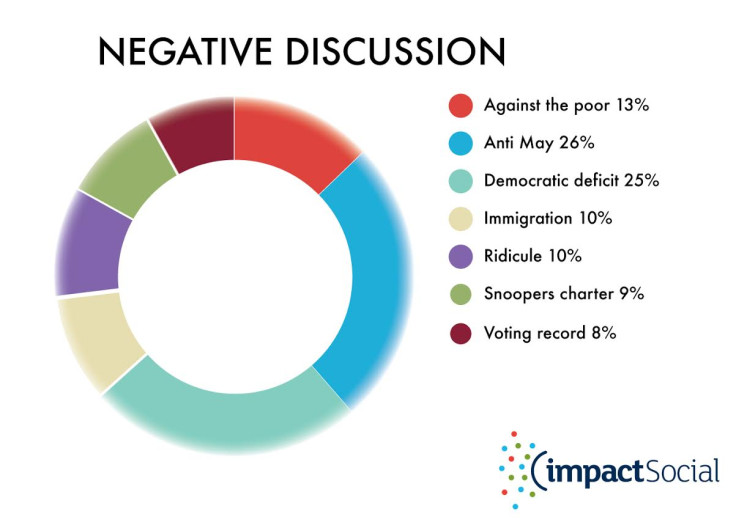The negative reaction to Theresa May will stick until she holds a general election
People are more resigned to her being PM than happy about it.
There's a strangely public school ritual to leaving Downing Street as prime minister. Following the eccentricities of the table banging of David Cameron's last Cabinet meeting, the staff, civil servants and special advisers (Spads) of Number 10, gather in the long corridor leading to the famous black door and the leaving prime minister walks one last time, through his team, thanking the red-eyed men and women who have run his life for the past six years.
When Tony Blair left in 2007, there was wailing and the virtual renting of garments from his staff, among whom he was enormously popular. When Gordon Brown came in, shortly after, to be welcomed in the same ritual, Blair's team had disappeared off to the pub. Career civil servants were left filling the gaps with Treasury and Foreign Office staff, hastily gathering like bodies at the Alamo, to make sure the press didn't see the gaps through the open door and draw their own conclusions.
It is into that heightened atmosphere that Theresa May will walk today – to a team of emotionally wrought civil servants and her own excited camp followers looking for Churchill's chair (and for the toilets), and into this ritualised process that the "normal" state school girl will walk, after six years of public school boys. But is anyone else excited?
The civil service, at least, will welcome her as the most competent pair of hands left standing among the contenders, the only one with the common sense to duck in the circular firing squad following the EU referendum.
But, outside Westminster and Whitehall, has her non-strategy, of standing still while others flailed, worked? Is she entering on a wave of relief after weeks of chaos?
Well, no. Not exactly.
The social media analysis company Impact Social looked at more than 200,000 posts and comments this week on social media sites and open news platforms which mentioned her name. Reading the discussion from the new PM's perspective things don't look so great for someone who has just achieved a lifetime's ambition.
The problem, from the point of view of May and her team, is that, even as an incoming prime minister, she faces a relatively higher level of negativity than is normal (29% of total mentions are negative, only 12% positive). She is starting the job without much credit in the bank – people are more resigned to her being PM than happy about it.

A large part of that particular problem comes from the sense she's not quite earned her place. An aborted election process even within her own party and her refusal to hold a general election points to a democratic deficit mentioned in a quarter of all negative posts. After, as a Remain campaigner, she lost a battle over membership of the "undemocratic" European Union, that hasn't gone down well.
Furthermore, as a senior member of the existing government, she's bringing her own baggage with her down that corridor in Number 10. Her record on immigration as home secretary, where her hard-line image and the "racist vans" failed to stop the numbers rising, was mentioned by 10% of posts as she was attacked from both left and right. The perception that she is "anti-poor" was raised by 13%. Her voting record (8%) and the Snoopers Charter (9%) are sticking to her as well. There's a lot of negativity from both sides of the political divide.
On the up side, she gets a lot of positivity for not being someone else. As British politics has gone into post-referendum meltdown, it helps not to be Leadsom/Johnson/Gove, for a while at least. The comparisons with that lot are favourable to almost anyone so she scores highly. May also gets points (7% of mentions) for being a bit like Thatcher (well, for being a woman at least).

Aside from that, though, May and her team have a lot to do if this is to be a long premiership. These numbers provide thin gruel. She is gently welcomed for stability by 5% of mentions, but, again, that's a relative concept in turbulent times. That stability is deemed good for the economy by 10%, but its the stability of her appointment not of her leadership that provides it. And her appropriation of Ed Miliband's stance on big business gets a better reception (even at 10%) than it did when he said it.
It's clear that May is tolerated as the best-we-can-hope-for-at-the-moment prime minister – the most underwhelming appointment since Lord Derby's "Who? Who?" ministry. Without an election that may be the best she can hope for, but if she avoids that challenge (another non-tactic when Labour are in such disarray), then she will have to grow into the role quite markedly if she is to be admired rather than merely accepted.
The strange thing about her as she walks through the door is the generally downbeat atmosphere around her. The biggest emotions she aroused during the leadership campaign were in her defence after Angela Leadsom's car-crash interview, it was nothing she generated herself. Standing still may have proved effective in the short term, but she'll need more if her next significant steps are not to be in virtual silence down that Number 10 corridor again.
© Copyright IBTimes 2025. All rights reserved.






















